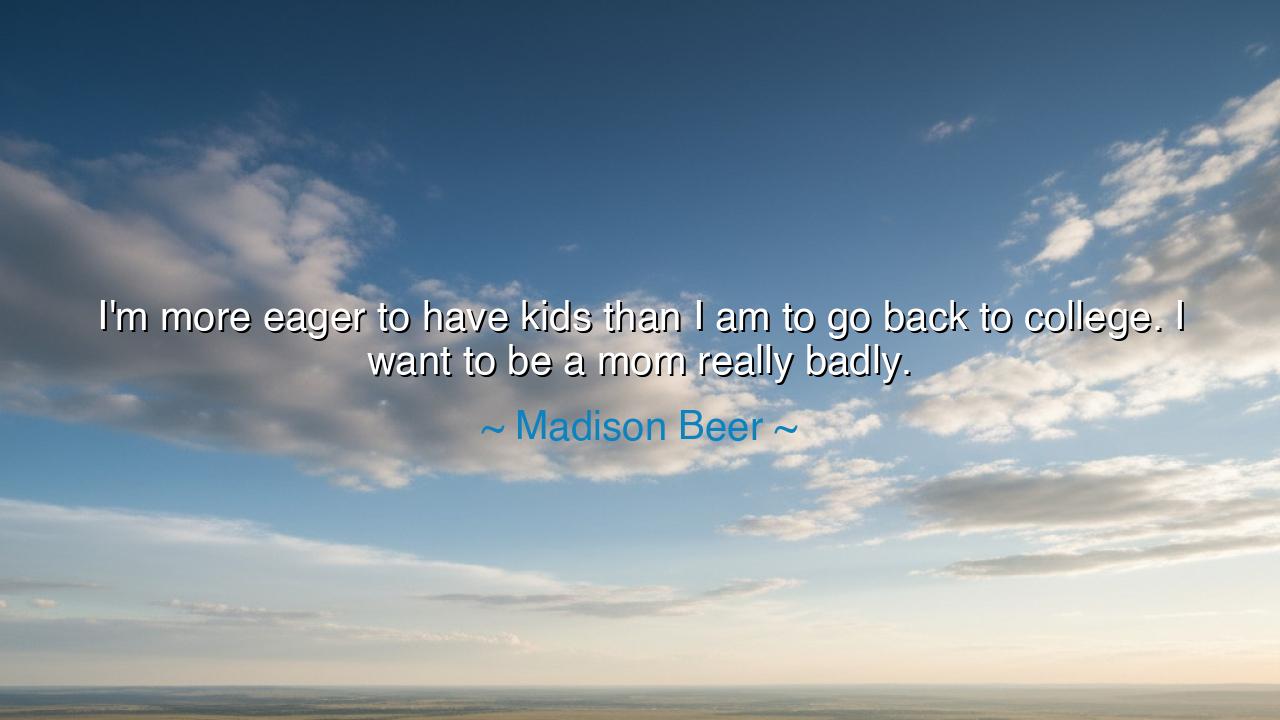
I'm more eager to have kids than I am to go back to college. I
I'm more eager to have kids than I am to go back to college. I want to be a mom really badly.






The words of Madison Beer — “I’m more eager to have kids than I am to go back to college. I want to be a mom really badly.” — flow with a yearning as old as time itself. Beneath their simple phrasing lies the echo of something eternal: the call toward creation, nurturing, and continuity. In an age when ambition is often measured by career, achievement, and education, Madison’s confession is not a rejection of learning — it is a declaration of where she believes the heart of meaning truly lies. Her longing to become a mother is not impulsive; it is instinctive — the whisper of nature reminding the soul of its deepest purpose: to give life, to love without condition, and to guide the next generation into being.
When she says she wants to be a mom, she speaks to the universal impulse that unites all living things — the desire to nurture, to protect, to build something beyond oneself. The ancients knew this truth well. In the mythic stories of old, the mother was not merely a figure of tenderness but of divine power — Gaia, the Earth herself, was the mother of all creation; Isis, in Egypt, resurrected her husband and raised her son to bring justice to the world. In these sacred archetypes, motherhood was not seen as limitation, but as the highest form of strength, for to give life and sustain it demands more courage than conquest, more devotion than desire.
Madison’s words also reveal something profoundly human — a longing for meaning through connection. College, though noble, represents the pursuit of knowledge; motherhood represents the pursuit of love. Knowledge refines the mind, but love shapes the soul. In expressing her eagerness for children, she touches upon an ancient principle: that true fulfillment is not found in what we accumulate, but in what we give. To nurture another being — to pour one’s heart into the growth of another soul — is among the highest forms of creation, equal to art, music, and philosophy.
This yearning recalls the story of Marie Curie, the great scientist who, though she spent her life in laboratories unlocking the mysteries of matter, was most devoted to her daughters, Irène and Ève. She once wrote, “Nothing in life is to be feared; it is only to be understood.” Yet in her private letters, she revealed that the truest understanding she ever found came not from science, but from motherhood — the quiet, everyday miracle of raising children who would carry her light into the world. Like Madison, she knew that the act of giving life and guidance is not lesser than achievement; it is its continuation in flesh and spirit.
But there is also courage in Madison’s words — the courage to voice a desire that runs against the current of her generation. The modern world often praises independence, ambition, and progress, yet it sometimes forgets the sacredness of nurturing. Her longing to be a mother “really badly” is not weakness — it is rebellion of the most sacred kind: the defiance of a culture that mistakes love for limitation. To yearn for family is to yearn for eternity. To dream of children is to dream of legacy, of continuity, of hope that does not end with one’s own breath.
In her admission, there is also wisdom: the recognition that motherhood is not a replacement for ambition, but its evolution. The desire to raise life does not negate the desire to learn; it deepens it. For the one who teaches a child teaches the future. The one who loves deeply learns truths no classroom could ever offer. The education of the heart, passed through generations, is older than any institution — it is the first and most enduring university of humanity.
The lesson we draw from this is eternal: to honor the call of the heart, even when the world does not understand it. If your soul yearns to build, to nurture, to guide — listen. Whether that calling manifests in motherhood, mentorship, or the care of others, it is sacred. Creation is not limited to art or invention; it lives in every act of giving. Love, after all, is the only force that multiplies when shared.
So let Madison Beer’s words echo across time as a reminder: the desire to be a mother is not a detour from greatness, but its purest form. To bring forth life — to shape the spirit of another with patience, strength, and tenderness — is to participate in the divine rhythm of creation itself. To want to be a mom “really badly” is to desire to become what the universe has always been: a giver of life, a keeper of love, and a teacher of eternity.






AAdministratorAdministrator
Welcome, honored guests. Please leave a comment, we will respond soon